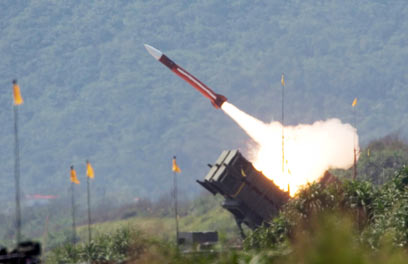
Report: US accelerating missile defenses in Persian Gulf
Officials tell New York Times deployment of antimissile systems in at least four Persian Gulf countries, special ships off Iranian coast intended to forestall any Iranian escalation of its confrontation with West if new set of sanctions imposed. 'There is certainly an element of calming the Israelis as well,' one of them says
The Obama administration is speeding up the deployment of new defenses against possible Iranian missile attacks in the Persian Gulf, placing special ships off the Iranian coast and antimissile systems in at least four Arab countries, the New York Times reported Saturday, citing administration and military officials.
Gen. David H. Petraeus, head of US Central Command, was quoted by NYT as saying that the acceleration of defensive systems — which began when President George W. Bush was in office — included “eight Patriot missile batteries, two in each of four countries.”
Patriot missiles are capable of shooting down short-range offensive missiles.
According to NYT, General Petraeus also described a first line of defense: He said the United States was now keeping Aegis cruisers on patrol in the Persian Gulf at all times. Those cruisers are equipped with advanced radar and antimissile systems designed to intercept medium-range missiles.
NYT said, "Those systems would not be useful against Iran’s long-range missile, the Shahab 3, but intelligence agencies believe that it will be years before Iran can solve the problems of placing a nuclear warhead atop that missile."
The deployments are also partly intended to counter the impression that Iran is fast becoming the most powerful military force in the Middle East and to forestall any Iranian escalation of its confrontation with the West if a new set of sanctions is imposed, the report quoted administration officials as saying.
In addition, they told NYT, the administration is trying to show Israel that there is no immediate need for military strikes against Iranian nuclear and missile facilities.

Patriot launching (Archive photo: AP)
Military officials told NYT that the countries that accepted the antimissile weapons were Qatar, the United Arab Emirates, Bahrain and Kuwait.
"They said the Kuwaitis had agreed to take additional defensive weapons to supplement older, less capable models it fielded years ago, while it awaits delivery of an upgraded system that it is seeking from the Raytheon Company. Saudi Arabia and Israel have long had similar equipment of their own," said the report.
“Our first goal is to deter the Iranians,” one senior administration official told NYT, "A second is to reassure the Arab states, so they don’t feel they have to go nuclear themselves. But there is certainly an element of calming the Israelis as well.”
The US Senate voted Thursday night to strengthen existing sanctions against Iran and impose new ones aimed at its gasoline supplies as part of the US effort to dissuade Tehran from pursuing nuclear weapons and cracking down on internal dissent.
On Thursday President Shimon Peres told International Atomic Energy Agency (IAEA) chief Yukiya Amano, "Nuclear weapons in the hands of a fanatical regime such as Iran's pose a threat not only to Israel but to the entire world."
Roni Sofer and AP contributed to the report










